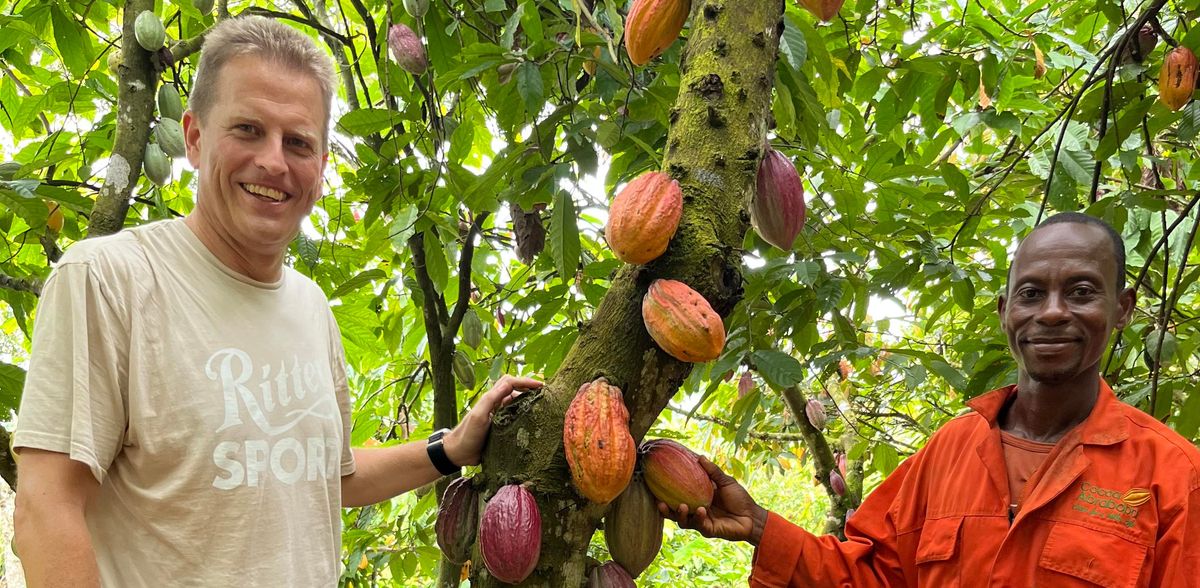Sustainable cultivation methods for greater resilience
Ritter publishes latest report on cocoa sourcing
Advertisement
cocoa is considered a comparatively small agricultural commodity market, but it has received a lot of attention recently. Due to several poor harvests in a row, volumes have plummeted and commodity prices have virtually exploded. Even though prices have fallen again somewhat recently, they are still well above the long-term average. It is clear that availability and quality can no longer be taken for granted.
Against this backdrop, Alfred Ritter GmbH & Co KG is now publishing the latest edition of its Cocoa Report. In it, the family-owned company summarizes the focus of its cocoa programs in West Africa and Latin America, documents progress and highlights the challenges facing cocoa cultivation today. This issue focuses on agroforestry as an approach to making cocoa cultivation more resilient in the face of climate change.
Insights into the supply chain: voices from the origin
"Our goal is transparency - both along our supply chain and with regard to our work at the origin," emphasizes Asmus Wolff, Managing Director Supply Chain at Ritter. Key figures should therefore enable comparability across the various programs. "Unlike coffee, most people only encounter cocoa in processed form, for example as chocolate. Few people are aware of the raw material itself and the specific challenges involved in growing it. That's why our cocoa report also gives farmers a voice. In concrete examples, they show how we can work together to improve conditions in the long term," explains Wolff. "The last two years have shown how urgently more economic and ecological resilience is needed in cocoa cultivation."
Certified and traceable back to the farm: cocoa for Ritter Sport chocolate
Ritter sources around 17,000 tons of cocoa mass and butter every year. This cocoa comes from Ghana, Côte d'Ivoire, Nicaragua and Peru. The Swabian family business has established cocoa programs in all of these countries. Since 2018, the cocoa for the entire range has been certified in accordance with the Rainforest Alliance Cocoa Program or the Fairtrade Cocoa Program. In the meantime, 99% of the cocoa can be traced back to the farm.
Note: This article has been translated using a computer system without human intervention. LUMITOS offers these automatic translations to present a wider range of current news. Since this article has been translated with automatic translation, it is possible that it contains errors in vocabulary, syntax or grammar. The original article in German can be found here.
Other news from the department business & finance
Most read news
More news from our other portals
See the theme worlds for related content
Topic world Quality assurance
In the food industry, quality assurance is about much more than safety. It's about ensuring consistent standards that meet consumers' taste, nutritional and aesthetic expectations. Using state-of-the-art analytical methods and strict protocols, Quality Assurance ensures that every product delivers on the brand's promise. From appearance and taste to texture and shelf life, Quality Assurance ensures consumers get exactly what they expect.

Topic world Quality assurance
In the food industry, quality assurance is about much more than safety. It's about ensuring consistent standards that meet consumers' taste, nutritional and aesthetic expectations. Using state-of-the-art analytical methods and strict protocols, Quality Assurance ensures that every product delivers on the brand's promise. From appearance and taste to texture and shelf life, Quality Assurance ensures consumers get exactly what they expect.
































































